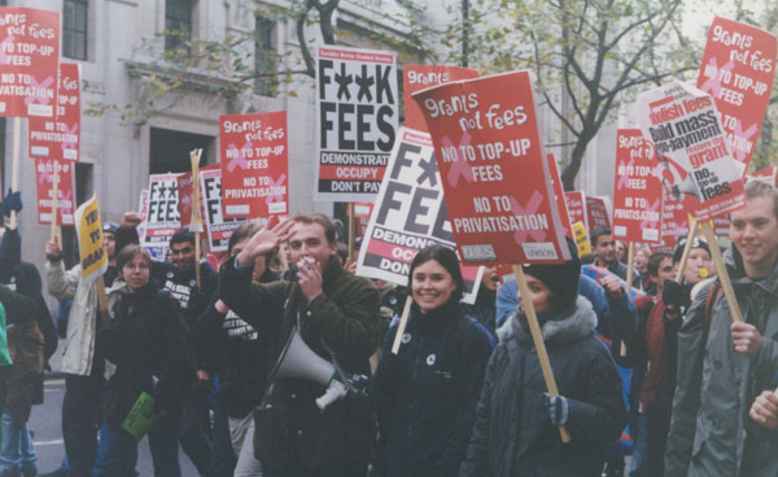 March against the introduction of student fees, 2000. Photo: wikimedia commons
March against the introduction of student fees, 2000. Photo: wikimedia commons
The coronavirus has exposed serious flaws in the university system, writes Dragan Plavšić
There was news yesterday that the government is considering imposing a cap on how many students universities will be allowed to admit this coming academic year. Reports suggest the cap will block universities from admitting more students than they did last year, though it may be stricter.
Why has this cap become necessary?
The number of international students seeking to study in the UK is set to fall significantly because of the coronavirus. Many are cancelling or postponing entry, especially as the government has indicated that restrictions of one kind or another may last six months, taking us into the new academic year.
This is significant. To take the clearest example, China sends more students to the UK than any other country. There are currently 120,000 Chinese students at UK universities, an increase of 34% over the last five years. Since international students pay higher tuition fees than domestic ones, the financial implications of a collapse in numbers are clear.
Universities have been quick to appreciate this. Some have jumped the gun on their competitors by making unconditional offers to domestic students in order to snap them up before anyone else does, regardless of the consequences for the university sector as a whole.
As a result, ruthless beggar-thy-neighbour competition has been threatening to break out which, if left to run its course, would wreak havoc. Universities at the upper end of the league tables would snap up students, while universities lower down would be left with insufficient admissions, jeopardising their financial viability and threatening jobs. In short, they could go bust.
It is another stark example of how in this crisis a free market left to its own devices would devastate an important sector of society.
To prevent this, the cap which the government plans to introduce is a state interventionist measure which would block the free market from operating in the usual way. By limiting the numbers universities can admit, competition for students will not be eliminated but it will be restricted from having the destructive impact it would otherwise certainly have.
The coronavirus crisis has therefore exposed serious flaws in the way the current university system operates. It has shone a clear light on its chaotic inner workings.
Ever since the Blair government introduced tuition fees in 1998, the logic of competition has been increasingly dominant in the university sector. As student fees have become an ever-greater proportion of university income compared to state funding, particularly after fees were trebled to £9,000 in 2012, competition for students has intensified in tandem with it.
More than ever, universities look and feel like businesses with students viewed as customers who must be attracted away from competitors for the sake of financial security. The most summary expression of all this has been the annual university league table. Universities are obsessed with their relative standing in it and it is an open secret that they do all they can to manipulate the results in their favour.
The decision to completely lift the cap on student numbers in 2015 was therefore the logical result of introducing student fees in 1998. The aim was to intensify competition on the neoliberal basis that this was the best way of increasing university admissions. But this was a thoroughly dog-eat-dog model of doing so, the flaws of which have been dramatically exposed in the current crisis.
One key consequence of this process has been a deteriorating staff-student ratio. The numbers of students for every university teacher have steadily increased over the years as universities compete for more and more students. As a result, the greatest complaint university teachers have today is not salaries but workload.
The cap the government proposes to introduce addresses only the most immediate problem, not the systemic flaw from which it arises. That requires more extensive measures. To begin with, it requires the scrapping of tuition fees, their replacement with student grants, the scrapping of university league tables, and the setting of a minimum staff-student ratio to be improved year on year to optimum levels.
These measures would begin to squeeze competition out of the university system. It is a grossly irrational way of organising universities and contradicts what should be their true purpose, to meet the educational needs of students.
These intermediate measures would serve as a stepping stone to the creation of a fully-fledged national education service where need not competition is the driving force. Under it, the university would become as integral a part of life as school. Only then will we be able to do away with caps of any sort.

